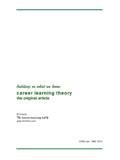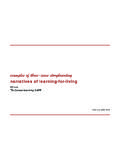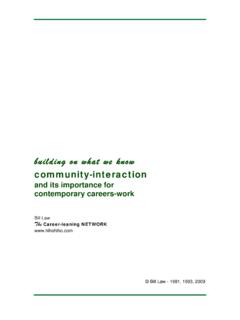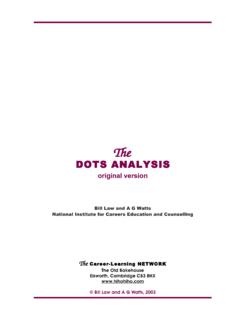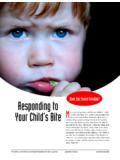Transcription of LEARNING FROM EXPERIENCE - hihohiho.com
1 Bill Law The Career- LEARNING NETWORK Bill Law 2006which way is forward? LEARNING FROM EXPERIENCE People make up their minds about working life in part on the basis of what they have seen-and-done. But they also learn from what we, as careers workers, know-and-enable. Their EXPERIENCE and our expertise are two different kinds of bases for action. Bill argues for more attention to EXPERIENCE . It is not that EXPERIENCE has greater authority; it is that there are some questions that EXPERIENCE can more-usefully answer, that those questions are becoming increasingly pressing, and that people s changing attitudes to LEARNING are changing how we should balance expertise and EXPERIENCE .
2 Using labour-market information as an example, he examines this aspect of our professionalism. That thinking resonates with two important policy-related papers: Youth Matters on community links, and the Tomlinson report on the 14-19 curriculum. This monograph will help you to: > review changing attitudes to LEARNING ; > probe new ideas for action; > examine their implications for careers work and related programmes; > programme needed expertise & EXPERIENCE ; > map your resources for this work; > locate your key contacts in the resulting network of help. The implications are radical. And Bill entertains some doubts about conventional wisdom concerning careers education and guidance. But nothing here diminishes the value of professional expertise - and its analyses.
3 Bill does, however, urge the value of other-than-professional helpers - and their narratives. We have, of course, always drawn on EXPERIENCE . And there are more possibilities for doing that in advice and guidance than we have yet worked out. But the most radical implications for drawing on learners EXPERIENCE are for what we do in curriculum. There are links between these ideas and others set out at DOTS analysis of careers work coverage ../ CPI extended to processes & influences ../movingon/CPITxt& EXPERIENCE calling on both expertise & EXPERIENCE ../ narrative EXPERIENCE can only be told as stories ../ All are designed to be useful in what we do in response to the green paper Youth Matters. contents page changing attitudes to LEARNING 1 how culture counts 1 dynamics of doubt LEARNING from EXPERIENCE and through narrative 2 so what can we do?
4 2 careers work ideas for action 3 careers work and change 3 the adviser with three brains 3 LEARNING from information and EXPERIENCE 4 from information to help 4 from EXPERIENCE to help 4 what narrative can do 5 working with labour-market information 6 working with labour-market EXPERIENCE 7 where EXPERIENCE takes LEARNING 9 why both policy and theory are important 10 more leads for careers-work help 11 finding the authority in EXPERIENCE 11 features of EXPERIENCE -based LEARNING 12 mapping your resources 15 purposes and methods 15 structures and dynamics 16 examples of EXPERIENCE -based LEARNING 17 locating key contacts 18 network management 18 what about our professionalism? 20 examples of programme management 21 paradigm shift?
5 21 more help 22 references 23 The Career- LEARNING Network - at - page 1 - changing attitudes to LEARNING The times they were a-changin ! ; as it turned out, more than any of us could have then known. Economic change on a global scale - and the technology which made it possible have dominated the last several decades. It is not what Bob Dillon had in mind. how culture counts: Changing economics and its technology are well documented in our field. Less well documented are how people seek to deal with change (Galbraith, 1992) and what that means for communities (Davies, 1998). Even more neglected are cultural changes - about the way people arrive at their beliefs and values, and the way they see themselves in the communities they inhabit (Eagleton, 2003).
6 There is no need to follow Terry Eagleton into every literary and philosophical by-way he signposts. But his wide-ranging map of post-modern attitudes especially those associated with gender, ethnicity and social-class - is important to our work. We might, in careers work, try to argue that such socio-emotional dynamics are none of our business; but they are. Some people argue that it is the economy that should be commanding our attention it is on the basis of economic benefit that influential support will be found. That may, until recently, have been the case. But the more we understand the extent and depth of contemporary change the more we understand that its dynamic alters everything politics, technology, economy, society and culture.
7 If we want to help with any, we must be involved in all. Not that careers education-and-guidance has neglected the need for new thinking. A call for transformation is linked to the need better to embed our work in the culture it serves (Bezanson, 2004). And there is a recognition of change at the extreme level of paradigm shift (Jarvis, 2003, there s more about shifting paradigms at the end of this monograph). panel one dynamics of doubt One version of the cultural-change story gets its start from some time back in the eighteenth-century Enlightenment . This was before Bob Dylan was born, and before John Lennon got round to his imagining. But both writers have their roots in an enlightenment challenge to arbitrary authority.
8 At that earlier time, the challenged authorities were crown and mitre. That loss of deference was no bad thing and was never going to stop there. All lites eventually become suspect (O Neil, 2002) - people look for alternative guides. First it was monarchs and priests who were distrusted, but - sooner or later - there were bound to be some doubts about careers-work professionals. Recent economic changes have pushed this trend on. A key feature is change is in how the labour economy is stratified (Goldthorpe, 2005). Upward structural social mobility has shifted the balance of social-and-political, as well as economic, influence. Some of your learners, whose parents and grandparents would have been taken for granted by the lites, now sense they have a voice - on what is worth buying, who is worth listening to, and what is worth doing.
9 Conventions and norms which constrained their forebears are gone good thing too. But you see what this means: what people do about working life is part of a more general demand for independence - reaching into family life, shopping malls, media and politics. These ideological and demographic trends are changing the relationship between careers work and it learners. The Career- LEARNING Network - at - page 2 - LEARNING from EXPERIENCE and through narrative: Cultural change is important to us because it changes the ways in which people learn for their lives: Three features: > a massive expansion in the ways people can access information - including information about working life; > new ways of making up their minds about what people will do about what they find often deliberately independent of what any kind of establishment or lite suggests; > a sharpening of other-than-professional influences on how such things should be worked out often rooted among friends, with family and in social-and-ethnic allegiances.
10 This is more than the so-called English distrust of intellectuals and their abstractions it is very much a feature of now. Chat-rooms, iPods, game-boxes, soaps, BB and video-phones speak of people s ideas about who we are , and who can be allowed to have a say in our lives . It varies neighbourhood-to-neighbourhood, but hang-loose informality, street-level credibility and demand for respect are prevalent. This is a world in which the informal use of the net (Vernon, 2005), the EXPERIENCE of friendship (Pahl, 2000), and social gossip (Dunbar, 2004) are dynamic features. It is a world in which claims to exclusively-authoritative professionalism serve nobody well. There is one special feature of cultural change. It is that people gather much of what they believe and value in narrative, rather than in analytic, terms.
